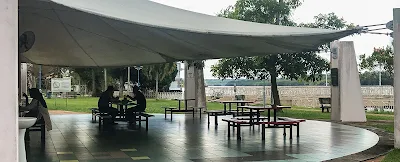The Kopi Tiam was unusually quiet that morning. Only a few customers were scattered around the tables, sipping coffee and reading newspapers.
I sat at my usual table, eagerly waiting for my friend Haji Kasim to join me. Instead, Awang Ramlal approached, looking less lively than usual. He took a seat at my table, and the Indonesian waitress came over to take his order.
"Usual 'teh tarik kurang manis'," Ramlal said casually.
Just as Haji Kasim arrived and settled into his seat, I noticed Ramlal's gloomy expression. "You don't seem happy today, Ramlal," I remarked.
"What's bothering you?" I asked.
Ramlal sighed and placed his hat on the table. He explained that he was having trouble renewing his license for recruiting foreign workers. Despite submitting his application and all the necessary documents online, he had been told that the required documents were missing. "I've resubmitted four times, but the problem remains. I don't know what's going on," he lamented.
Haji Kasim chimed in, saying that this issue wasn't unique to Ramlal. Many other businesses were facing similar problems. He explained that the online application system for foreign worker licenses and renewals, introduced by the Labour Department in 2016, was intended to streamline processes and increase efficiency. However, since its launch in April 2023, the system had been plagued by glitches and technical issues, causing frustration and concern among employers.
"It's true," Ramlal agreed. "Employers have encountered various problems throughout the application process, from registration to submission and tracking. These issues have caused significant delays and uncertainty, making it increasingly difficult for us to meet our staffing needs and fulfill our clients' demands."
I listened to Ramlal and Haji Kasim's concerns, and I could see how frustrated they were. I knew that the online application system had the potential to be a valuable tool, but it was clear that it wasn't working as intended.
"We need the authorities to take immediate action to address these issues," I suggested.
"I may not know much about the system, but it's clear that improving the design and implementation of the online platform should be a priority," I continued. "The authorities should ensure a seamless and user-friendly experience for employers. Additionally, providing regular and transparent updates on the application status would alleviate the uncertainties we face."
Haji Kasim nodded in agreement. "The online application system has the potential to be a valuable tool, offering convenience and efficiency. But without prompt and comprehensive improvements, its full potential remains untapped. The authorities must invest the necessary resources and efforts to make it function effectively, as originally intended."
We talked for a while longer, brainstorming some specific suggestions for how the system could be improved. We agreed that simplifying and streamlining the registration process would make it more accessible and user-friendly. We also discussed the importance of addressing the reliability and security of application submissions, as well as establishing a robust and efficient tracking system. Finally, we agreed that providing comprehensive support and assistance, including user guides and dedicated helplines, would help employers navigate the system effectively.
We finished our coffee and snacks, feeling a sense of hope that the authorities would take our suggestions seriously and make the necessary improvements to the online application system. As we stepped out of the Kopi Tiam, we carried with us the belief that progress was on the horizon, ready to face whatever challenges lay ahead with a newfound sense of resilience and optimism. MHO/07?2023


.png)
.jpeg)

















